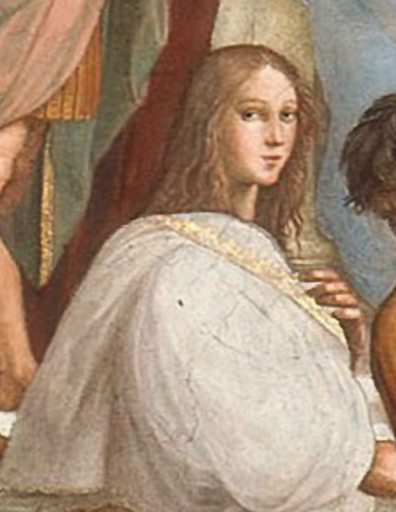The directory «Plots»
Hypatia (Ὑπᾰτία ἡ Ἀλεξάνδρεῖα)
350/370—415

Hypatia, , mathematician, astronomer, and philosopher who lived in a very turbulent era in Alexandria’s history. She is the earliest female mathematician of whose life and work reasonably detailed knowledge exists.
Hypatia was the daughter of Theon of Alexandria, himself a mathematician and astronomer and the last attested member of the Alexandrian Museum (see Researcher’s Note: Hypatia’s birth date). Theon is best remembered for the part he played in the preservation of Euclid’s Elements, but he also wrote extensively, commenting on Ptolemy’s Almagest and Handy Tables. Hypatia continued his program, which was essentially a determined effort to preserve the Greek mathematical and astronomical heritage in extremely difficult times. She is credited with commentaries on Apollonius of Perga’s Conics (geometry) and Diophantus of Alexandria’s Arithmetic (number theory), as well as an astronomical table (possibly a revised version of Book III of her father’s commentary on the Almagest). These works, the only ones she is listed as having written, have been lost, although there have been attempts to reconstruct aspects of them. In producing her commentaries on Apollonius and Diophantus, she was pushing the program initiated by her father into more recent and more difficult areas.
She was, in her time, the world’s leading mathematician and astronomer, the only woman for whom such claim can be made. She was also a popular teacher and lecturer on philosophical topics of a less-specialist nature, attracting many loyal students and large audiences. Her philosophy was Neoplatonist and was thus seen as “pagan” at a time of bitter religious conflict between Christians (both orthodox and “heretical”), Jews, and pagans. Her Neoplatonism was concerned with the approach to the One, an underlying reality partially accessible via the human power of abstraction from the Platonic forms, themselves abstractions from the world of everyday reality. Her philosophy also led her to embrace a life of dedicated virginity.
An early manifestation of the religious divide of the time was the razing of the Serapeum, the temple of the Greco-Egyptian god Serapis, by Theophilus, Alexandria’s bishop until his death in 412 ce. This event was perhaps the final end of the great Library of Alexandria, since the Serapeum may have contained some of the Library’s books. Theophilus, however, was friendly with Synesius, an ardent admirer and pupil of Hypatia, so she was not herself affected by this development but was permitted to pursue her intellectual endeavours unimpeded. With the deaths of Synesius and Theophilus and the accession of Cyril to the bishopric of Alexandria, however, this climate of tolerance lapsed, and shortly afterward Hypatia became the victim of a particularly brutal murder at the hands of a gang of Christian zealots. It remains a matter of vigorous debate how much the guilt of this atrocity is Cyril’s, but the affair made Hypatia a powerful feminist symbol and a figure of affirmation for intellectual endeavour in the face of ignorant prejudice. Her intellectual accomplishments alone were quite sufficient to merit the preservation and respect of her name, but, sadly, the manner of her death added to it an even greater emphasis.
Korea Nord, 1983, The School of Athens
Sierra Leone, 1983, Pythagoras, Parmenides, Heraclitus and Hypatia
Sierra Leone, 1983, The School of Athens
Spain, 2010, Poster to the movie "Agora"